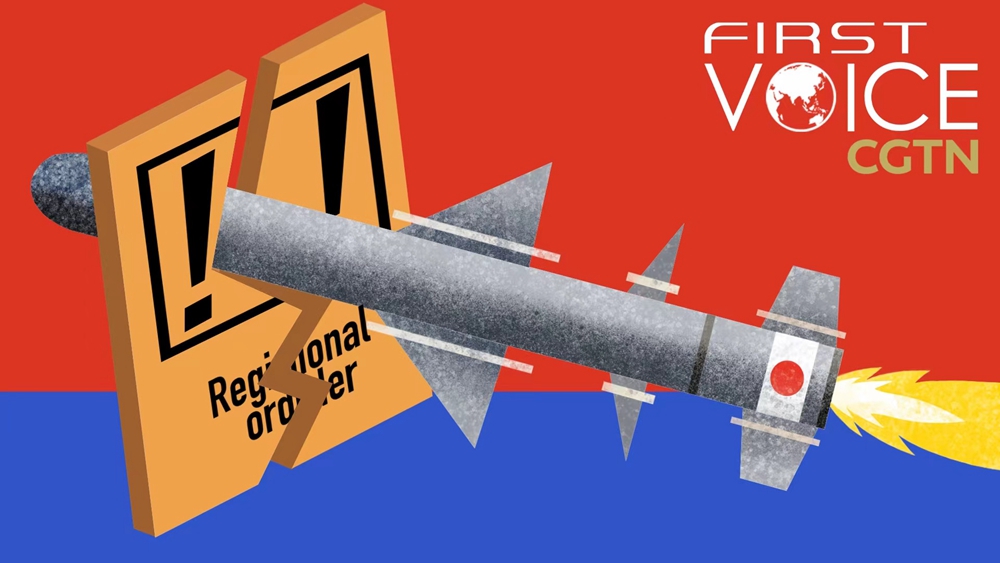
Editor's note: CGTN's First Voice provides instant commentary on breaking stories. The daily column clarifies emerging issues and better defines the news agenda, offering a Chinese perspective on the latest global events.
On August 21, Japan's Yomiuri newspaper reported that Tokyo is considering the deployment of more than 1,000 long-range cruise missiles to narrow the "missile gap" with China. The missiles, according to the report, would be a modified version of Japan's ground-launched Type-12 standoff missiles with their range upgraded from around 200 kilometers to cover more than 1,000 km. With them mainly stationed in the southwestern islands and Kyushu region, this potential deployment would place China's coastal areas within Japan's striking distance.
Talking about heating up regional tensions!
Tokyo's deployment of such missiles hasn't come a sudden surprise. Japan's defense ministry launched the development of land-propelled missiles in fiscal 2021, according to Nikkei. Japan's ruling Liberal Democratic Party proposed the government to develop counter strike capabilities, and Prime Minister Fumio Kishida said that Japan will "drastically strengthen its defense capabilities within five years" including "the possession of counter strike capabilities." This new deployment, based on the Japan Times' analysis, could be the center of the talks on Japan acquiring counter strike capabilities in the upcoming months as the country looks to complete its revision of its National Security Strategy.
Some analyses have pointed to China's recent military exercises in responding to U.S. Speaker of the House Nancy Pelosi's visit to China's Taiwan region as an excuse for Japan rolling this program out. Some have credited the Democratic People's Republic of Korea as the primary threat that led Tokyo to conceive the idea. But these are just excuses and unimportant associations.
Japan, since the end of WWII, has had its military forces in shackles. Offensive military capabilities were banned under the Japanese Constitution drafted under the U.S.'s supervision. Nonetheless, over the years, Japan has tried to shake off the shackles one piece at a time. Its Self-Defense Forces acquired broader and broader scope. Its "self-defense" mandate had gone from protecting itself to protecting allies in 2015 after a vote in the National Diet, and in recent years has begun forging defense treaties with other countries and flirted with NATO cooperation. And last December, with totaling more than $940 billion, Japan's cabinet approved the country's largest annual budget package in decades. The steps taking this year is focusing on arming the forces with capabilities to attack other countries' bases.
Despite changing leaderships and political situations, Tokyo had walked steadily on a path to regain full military autonomy. By going one-step at a time, the government has chipped away many of the restraints of the post-war constitution that have been placed on it and gradually turning the public to its side. Now, 64 percent of the Japanese see the enemy base strike capability, once considered extreme and controversial, as "necessary." And on the overall defense posture, only 10 percent of Japanese opposed to Tokyo bolstering its defense forces.
The key to postwar peace in East Asia is a demilitarized Japan. The Allied Powers decided to ensure that Tokyo will stand incapable of ever waging wars again, which laid the foundation for peace between the major powers in East Asia for decades. And Japan was on its way to become the world-renowned pacifist nation.
That pacifism is quickly eroding before our eyes. As Japan taps into America's strategic interests in the region and plays up the different "threats" in East Asia, the country is using any excuse it could find to rearm itself at an alarming rate. The Japan Self-Defense Force is already one of the world's finest military forces, and its capabilities are making "self-defense" a concept in name-only.
As Japan gets more and more militarily capable, it might be too late to stop the train going down the track. The only thing that countries in the region can do is make sure they are prepared – mentally and physically - for what might be coming ahead.

 中文
中文



